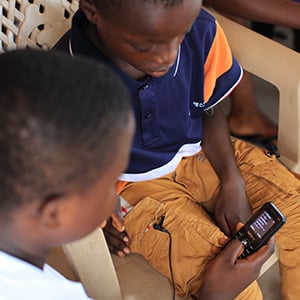Between classes, her son used to wander around, causing her great distress – he should spend more time studying, she thought.
Yvette Yapo, a cocoa farmer in rural Côte d’Ivoire, couldn’t check on her son’s whereabouts: her work in the cocoa fields and the other domestic chores she has to plough through each day made sure of that. As a result, her son was often left to his own devices – and his grades suffered.
"I had to scold him to study more," Yvette recalls.
Mobile technology to the rescue
A new initiative aimed at keeping pupils in rural Côte d’Ivoire engaged in school using a virtual classroom concept – through mobile phones and SMS technology – is helping change that.
"At the heart of this initiative is the idea that a child attending school is less likely to end up working in the fields," said Carole Attoungbre, the director of Eneza Education, who is leading the initiative sponsored by Nestlé and the International Cocoa Initiative. "Our goal is to help these children improve their results at school and get them to stay in the education system as long as possible."
As a native from Côte d’Ivoire – where 40% of the world’s cocoa is sourced – Carole has seen too many children like Yvette’s son drop out of school only to end up working in cocoa fields. To be fair, the odds are often stacked against them: families in rural communities often can’t afford the fees associated with school (think textbooks, uniform, and so on). When they can, because schools are remote and transportation is lacking, children are forced to walk long distances to get to the nearest school.
More engaged school pupils

The program, launched in January 2019, has provided 500 primary and secondary pupils in rural areas with mobile devices. These handsets give children free access to interactive educational content via SMS – content that complements their school curriculum and helps them strengthen their performance in the classroom. The courses, validated by the Ministry of Education, are structured by disciplines and tailored to their education levels. Children can learn at their own pace, ask questions to teachers in real time, track their own performance, or change subject at any time – just using the phone's keypad.
Yvette says the initiative has changed things for the better in her household. "Since he has received this phone, my son spends a lot more time at home, revising his lessons on the phone," she said. “I am happy: I don't have to worry about him studying again."
Making a difference
If SMS messages are hardly revolutionary, the 20-year-old technology is offering a fresh take on a long-standing issue – helping reverse poor school attendance rates in rural African communities.

"This partnership shows that improving the living conditions of cocoa communities is a topic that Nestlé is serious about," said Carole from Eneza Education.
Rolled out within the child labor monitoring and remediation system of the Nestlé Cocoa Plan, this initiative is squarely aimed at tackling child labor and improving the lives of farmers and their families.
It is about more than improving the children’s performance at school and keeping them away from child labor, Carole insists. "It is a way to empower them so that they have a say in their future. Having access to education gives these children, whose parents are poor most of the time, the opportunity to break the poverty circle," she said. "And it's really great to contribute to that."







